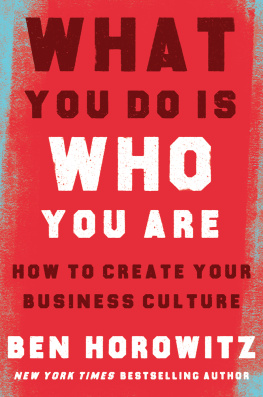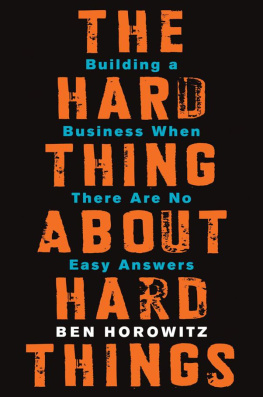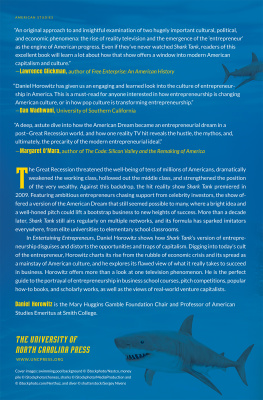Ben Horowitz - What You Do Is Who You Are: How to Create Your Business Culture
Here you can read online Ben Horowitz - What You Do Is Who You Are: How to Create Your Business Culture full text of the book (entire story) in english for free. Download pdf and epub, get meaning, cover and reviews about this ebook. year: 2019, publisher: HarperCollins Publishers, genre: Business. Description of the work, (preface) as well as reviews are available. Best literature library LitArk.com created for fans of good reading and offers a wide selection of genres:
Romance novel
Science fiction
Adventure
Detective
Science
History
Home and family
Prose
Art
Politics
Computer
Non-fiction
Religion
Business
Children
Humor
Choose a favorite category and find really read worthwhile books. Enjoy immersion in the world of imagination, feel the emotions of the characters or learn something new for yourself, make an fascinating discovery.
- Book:What You Do Is Who You Are: How to Create Your Business Culture
- Author:
- Publisher:HarperCollins Publishers
- Genre:
- Year:2019
- Rating:3 / 5
- Favourites:Add to favourites
- Your mark:
- 60
- 1
- 2
- 3
- 4
- 5
What You Do Is Who You Are: How to Create Your Business Culture: summary, description and annotation
We offer to read an annotation, description, summary or preface (depends on what the author of the book "What You Do Is Who You Are: How to Create Your Business Culture" wrote himself). If you haven't found the necessary information about the book — write in the comments, we will try to find it.
Ben Horowitz: author's other books
Who wrote What You Do Is Who You Are: How to Create Your Business Culture? Find out the surname, the name of the author of the book and a list of all author's works by series.
What You Do Is Who You Are: How to Create Your Business Culture — read online for free the complete book (whole text) full work
Below is the text of the book, divided by pages. System saving the place of the last page read, allows you to conveniently read the book "What You Do Is Who You Are: How to Create Your Business Culture" online for free, without having to search again every time where you left off. Put a bookmark, and you can go to the page where you finished reading at any time.
Font size:
Interval:
Bookmark:
This is for all the people serving time who did what they did, but are now doing something positive. I see what you are doing. I know who you are.
One hundred percent of my portion of the proceeds of this book will go to help people coming out of prison change their culture and remain free, and to the people in Haiti trying to rebuild their society and return to the glory of their past.
In the secular bible that launched the Harlem Renaissance, The New Negro: An Interpretation, the indefatigable black bibliophile Arturo Schomburg argued in his essay The Negro Digs Up His Past that for too long the Negro has been a man without a history because he has been considered a man without a worthy culture. The Puerto Ricanborn Schomburg didnt just write about recovering this subsumed culture in white America; he recentered it by amassing one of historys greatest collections of manuscripts, art, and rare artifacts, which eventually provided the foundation for one of the crown jewels of the New York Public Library system: Harlems Schomburg Center for Research in Black Culture, a fortress of learning and enlightenment located at 515 Malcolm X Boulevard in the heart of historic Harlem.
Almost a century later, another visionary in our midst, the Silicon Valley tech entrepreneur Ben Horowitz, has produced a fascinating volume at the intersection of business, leadership, and culture studies that rests on the same intellectual foundation as the mighty Schomburg. There is a lesson within a lesson at play in these pages. Instead of turning out one more book using winning case studies on the importance of fostering a thriving, mutually supportive workplace culture, Horowitz roots his own definition of innovation in the deliberate choices he makes to center the leadership stories of present, past, and long past people of color far outside the C-suite or open floor plans of todays tech giants. They include Toussaint Louverture, the genius behind the only successful slave rebellion in the history of the western hemisphere, the Haitian Revolution of the late-eighteenth/early-nineteenth century; the samurai of Japan, whose bushido code elevated virtues above values; Genghis Khan, the ultimate outsider who led one of historys most dominant armies by absorbing the best and brightest among those he defeated; and, perhaps most moving of all, James White, aka Shaka Senghor, who, on a devastating murder conviction, stepped out of quarantine into the belly of the Michigan prison system to become the leader of a violent squad called the Melanics that, over time, he shepherded toward a culture revolution focused on community uplift after prison.
By placing these dynamic figures at the center of his study, Horowitz underscores his own reputation as one of the tech industrys most philosophically committed innovatorssomeone who defines creation not as the execution of an already good idea but as an original one that is so cutting edge that it is considered contrarian at best. Here, Horowitz is out to persuade readers to adopt his experiential view that the most robust, sustainable cultures are those based on action, not words; an alignment of personality and strategy; an honest awareness and assessment of the norms imbibed on the first day of work by newnot veteranemployees grasping at what it will take to make it; an openness to including outside talent and perspectives; a commitment to explicit ethics and principled virtues that stand out and have meaning; and, not least, a willingness to come up with shocking rules within an organization that indelibly and inescapably prompt others to ask, Why?
To prove why himself, Horowitz doesnt go to the usual well of Fortune 500 winners but to the outer edges of history, where we discover leaders whose stories reveal lessons and insights that are actually core to the creation of culture itself.
In its essence, What You Do Is Who You Are is a book whose content and structureincluding the epigraphs Horowitz invokes from the canon of hip-hop legendsperfectly reflect the thesis at work in its pages. It also happens to be an energetic read, with surprising and illuminating applications of the lessons of Louverture, Senghor, and company to the contemporary business and political scene that Horowitz himself, as the former CEO of LoudCloud and cofounder of Andreessen Horowitz, inhabits as one of todays most uniquely gifted leaders. In this way, Horowitz calls upon a key aspect of the African-American tradition of signifyingriffing as a mode of homage, a nod of admiration and respectand he does so with penetrating insight and memorable effect. The book is also an inspiring nod to an historical tradition that intellectual antecedents such as Arturo Schomburgcaught in the throes of Jim Crow segregated Americasacrificed so much to canonize, hoping that generations hence would see behind the veil, as W.E.B. Du Bois put it, to mine lessons for a new, truly cosmopolitan world culture in which they could only dream of flourishing. By centering his transformational volume on culture-makers whose wisdom is found on the margins, Horowitz gives us an instant classic with the potential to redefine what we do and, thereby, who we are.
Revel in being discarded, or having all your energies exhausted in vain; only those who have endured hardship will be of use. Samurai who have never erred before will never have what it takes.
Hagakure
When I first founded a company, one called LoudCloud, I sought advice from CEOs and industry leaders. They all told me, Pay attention to your culture. Culture is the most important thing.
But when I asked these leaders, What exactly is culture, and how can I affect mine? they became extremely vague. I spent the next eighteen years trying to figure this question out. Is culture dogs at work and yoga in the break room? No, those are perks. Is it your corporate values? No, those are aspirations. Is it the personality and priorities of the CEO? That helps shape the culture, but it is far from the thing itself.
When I was the CEO of LoudCloud, I figured that our company culture would be just a reflection of my values, behaviors, and personality. So I focused all my energy on leading by example. To my bewilderment and horror, that method did not scale as the company grew and diversified. Our culture became a hodgepodge of different cultures fostered under different managers, and most of these cultures were unintentional. Some managers were screamers who intimidated their people, others neglected to give any feedback, some didnt bother returning emailsit was a big mess.
I had a middle managerIll call him Thorstonwho I thought was pretty good. He worked in marketing and was a great storyteller (an essential marketing skill). I was shocked to find out, from overhearing casual conversations, that he was taking storytelling to another level by constantly lying about everything. Thorston was soon working elsewhere, but I knew I had to deal with a much deeper problem: because it had taken me years to find out that he was a compulsive liar, during which time hed been promoted, it had become culturally okay to lie at LoudCloud. The object lesson had been learned. It did not matter that I never endorsed it: his getting away with it made it seem okay. How could I undo that lesson and restore our culture? I hadnt the first clue.
To really understand how this stuff works, I knew I had to dig deeper. So I asked myself, How many of the following questions can be resolved by turning to your corporate goals or mission statement?
- Is that phone call so important I need to return it today, or can it wait till tomorrow?
- Can I ask for a raise before my annual review?
- Is the quality of this document good enough or should I keep working on it?
Font size:
Interval:
Bookmark:
Similar books «What You Do Is Who You Are: How to Create Your Business Culture»
Look at similar books to What You Do Is Who You Are: How to Create Your Business Culture. We have selected literature similar in name and meaning in the hope of providing readers with more options to find new, interesting, not yet read works.
Discussion, reviews of the book What You Do Is Who You Are: How to Create Your Business Culture and just readers' own opinions. Leave your comments, write what you think about the work, its meaning or the main characters. Specify what exactly you liked and what you didn't like, and why you think so.











